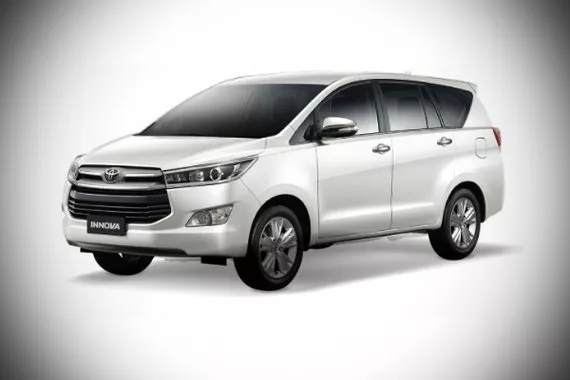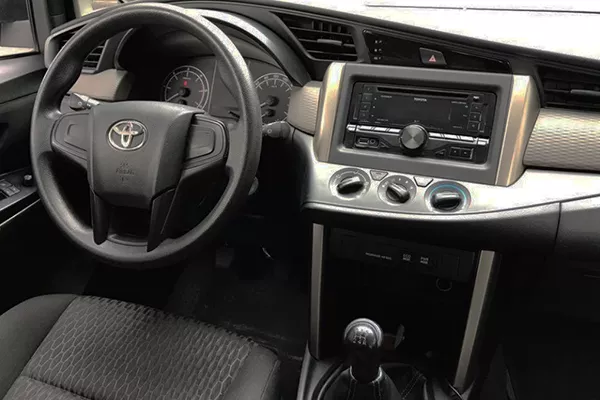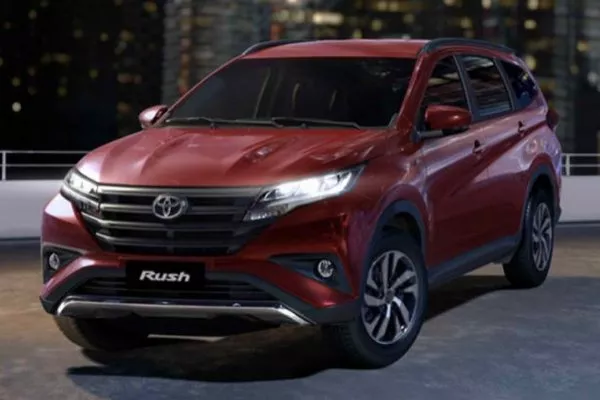In this article...
- 1. Toyota Rush G vs Toyota Innova J 2.8: MPV siblings battle it out
- 2. Toyota Rush G vs Toyota Innova J 2.8: Exterior
- 3. Toyota Rush G vs Toyota Innova J 2.8: Interior
- 4. Toyota Rush G vs Toyota Innova J 2.8: Engine and Performance
- 5. Toyota Rush G vs Toyota Innova J 2.8: Safety
- 6. Toyota Rush G vs Toyota Innova J 2.8: Variants and Pricing
- 7. Toyota Rush G vs Toyota Innova J 2.8: Conclusion
1. Toyota Rush G vs Toyota Innova J 2.8: MPV siblings battle it out
Since the early 2000s, Toyota has been making and selling MPVs, and most of them have dominated the Asian market. In 2004, the Japanese carmaker introduced the Innova. It is now on its second-generation, and it looks like it won’t be slowing down anytime soon.
Later on, in 2017, Toyota released the Rush, a macho looking, SUV-styled MPV based on the Avanza. Now both of these models are notable for being among the few MPVs to have body-on-frame builds.
That of course, is a boon for the family-oriented Filipino who needs to contend with rough roads once in a while.
However, it appears that the Toyota Rush G and the Toyota Innova J fall at around the same price range. So it’s inevitable to ask which one has the better specs. So, let’s answer that question.
2. Toyota Rush G vs Toyota Innova J 2.8: Exterior
Before we start comparing their dimensions, let us mention first that the Rush and the Innova belong to different vehicle classes. The former is a subcompact MPV, while the latter is a compact MPV. As such, the Innova is far larger than the Rush.
The Innova J measures 4,735 mm long, it is 1,830 mm wide, and 1,795 mm in height. Its wheelbase is also 2,750 mm long, and it has a minimum ground clearance of 178 mm. In comparison, the Rush G is 4,435 mm in length, 1,695 mm wide, and 1,705 mm high.
And lastly, its wheelbase measures 2,685 mm long. So overall, the Rush is obviously a smaller vehicle compared to the Innova. While that might be the case, the Rush actually has more ground clearance at 220 mm.

Which model floats your boat in terms of styling?
When it comes to exterior features, the Rush G simply has more. It comes with a roof rail, LED headlamps, and an LED rear combination lamp. Compare that to the entry-level Innova J with its more basic halogen headlamps and bare roof. Even the Innova J’s wheels are a simpler 16-inch steel set, while the Rush G’s are 16-inch alloys.
>>> Related:
3. Toyota Rush G vs Toyota Innova J 2.8: Interior
This is where the Innova J trumps the Rush G. Due to being larger, the former obviously provides more legroom and more elbow room for its passengers.
It also has one more seat than the Rush G’s seven. As for the seats themselves, both vehicles have a 60:40 fold with slide and recline adjustment, and both models all have fabric clad seats.

The interior of the Innova bears a lot of similarities to the interiors of the Hilux and Fortuner
When it comes to amenities though, Rush G leaves the Innova J in the dust. Its air-conditioning is an automatic climate control system with a rear blower, and its entertainment system is a seven-inch touchscreen with Bluetooth, USB, Aux-in, and Weblink smartphone connectivity.
It even has more speakers totaling at eight. Sure, the Toyota Innova does have rear AC vents, but its AC unit is a simpler manual system, and its on-board entertainment system is a more basic 2-DIN unit with USB, Aux-in, and only four speakers.
>>> Related:
4. Toyota Rush G vs Toyota Innova J 2.8: Engine and Performance
Apart from being more cavernous, the Toyota Innova J’s engine is more powerful than the Rush G’s. The 2.8-liter inline-4 turbo diesel that propels the Innova J can make up to 167 horsepower and 343 Nm of torque. Power is sent to the rear via a five-speed manual.
In comparison, the Rush G uses a smaller 1.5-liter gasoline four-banger that can churn out a maximum of 102 horsepower and 132 Nm of torque. Power is also sent to its rear wheels, albeit through a four-speed automatic.
Note that the Rush also has a five-speed manual variant, and the Innova’s higher-spec trims also have automatic versions.
For suspensions, the Innova comes standard with a double-wishbone type for the front, and a 4-link with a coil spring for the rear. In comparison, all variants of the Toyota Rush are equipped with MacPherson struts for the front and an axle type five-link for the rear. Both models have ventilated front disc brakes and leading-trailing rear drum brakes.
| Specs | Toyota Innova J 2.8 | Toyota Rush G 1.5 |
| Engine | 1GD-FTV inline-4 turbo diesel | 2NR-VE inline-4 gasoline |
| Displacement | 2.8-liters | 1.5-liters |
| Transmission | 5-speed manual | 4-speed automatic |
| Horsepower | 167 horsepower | 102 horsepower |
| Torque | 343 Nm | 134 Nm |
>>> Related:
5. Toyota Rush G vs Toyota Innova J 2.8: Safety
For safety, both the Rush G and Innova J are equipped with anti-lock braking with electronic brake distribution, a high mount stop lamp, an anti-theft alarm with engine immobilizer, ISOFIX, and child-proof locks.
The Rush G, however, also comes with more driver-assist features. It’s equipped with stability control, hill-start assist, a rear parking camera, and parking sensors.
When it comes to airbags, the Innova J only has dual front airbags and a driver’s knee airbag. The Rush G, on the other hand, has a total of six. So apart from dual front airbags, the smaller vehicle also has front side airbags and curtain airbags.
6. Toyota Rush G vs Toyota Innova J 2.8: Variants and Pricing
| Toyota Innova Variants | Price |
| Toyota Innova J 2.0 MT (Gasoline) | ₱1,036,000 |
| Toyota Innova J 2.8 MT (Diesel) | ₱1,146,000 |
| Toyota Innova E 2.0 MT (Gasoline) | ₱1,178,000 |
| Toyota Innova E 2.0 AT (Gasoline) | ₱1,248,000 |
| Toyota Innova E 2.8 MT (Diesel) | ₱1,250,000 |
| Toyota Innova Touring Sport 2.8 MT (Diesel) | ₱1,320,000 |
| Toyota Innova E 2.8 AT (Diesel) | ₱1,320,000 |
| Toyota Innova G 2.0 AT (Gasoline) | ₱1,320,000 |
| Toyota Innova Touring Sport 2.8 AT (Diesel) | ₱1,390,000 |
| Toyota Innova G 2.8 MT (Diesel) | ₱1,467,000 |
| Toyota Innova G 2.8 AT (Diesel) | ₱1,537,000 |
| Toyota Innova V 2.8 AT (Diesel) | ₱1,694,000 |
>>> A collection of Toyota Innova for sale at the cheapest price
| Toyota Rush Variants | Price |
| Toyota Rush E 1.5 MT | ₱968,000 |
| Toyota Rush E 1.5 AT | ₱1,008,000 |
| Toyota Rush G 1.5 AT | ₱1,100,000 |
7. Toyota Rush G vs Toyota Innova J 2.8: Conclusion
When it comes to the specific variants we’ve compared, Rush G has more amenities and safety equipment, while the Innova has more power and space.
However, the Innova and the Rush aren’t really meant to compete with each other. They each have their own strengths and weaknesses, and a buyer will want one or the other for several reasons.
For the Rush, its strengths are being able to provide ample occupancy, without being hefty. At the same time, its small size also means that it is able to deal with smaller city roads with ease.
The Innova, on the other hand, is larger, so it can provide a more spacious and relatively more comfortable ride. By being larger, it might also be a bit harder to drive and park the Innova in the city.

While the Rush is cheaper than the Innova, its pricing is a bit narrower
So in the end, it all depends on what the buyer needs. For more car comparison articles, keep reading here on Philkotse.com.
Recent posts
- Toyota Rush vs Avanza: Comparison of specs, features, etc Jan 17, 2023
- Toyota Hiace Cargo philippines launch Sep 21, 2022
- Why is the Toyota Rush such a hit to Filipino car buyers? Apr 15, 2021
- 2020 Toyota Innova vs Toyota Fortuner Specs Comparison Mar 30, 2021
- 7 reasons why the Toyota Rush is a good buy in 2019 Sep 24, 2020




![[Auto brawl 101] Mazda CX5 vs Toyota RAV 4: Which to buy?](https://img.philkotse.com/crop/94x52/2019/03/04/b7Fg1q9w/cx5-vs-rav4-bbe1.jpg)






